#intellectual impairment
Explore tagged Tumblr posts
Text
i think we also need more compassion for those of us with higher support needs who have difficulties communicating and understanding things, with or without an intellectual disability. i get made fun of a lot for not having “proper” communication abilities that “match” my age and for not understanding “obvious” concepts/jokes that to me were not obvious at all. please have kindness for autistics who have difficulty with things you don’t. even if you are also autistic.
#autism#medium support needs#high support needs#autpunk#disability#neurodivergent#actually autistic#cognitive disability#level 2 autism#level 3 autism#personally i have a cognitive impairment but not intellectual disability. in addition to my autism#i think a lot of times people don’t understand cognitive impairments and that they can occur without ID in severe forms as well#of course people with ID are just as deserving of support! as everyone else#just thought i would clarify#neuropunk#my text#higher support needs
115 notes
·
View notes
Text
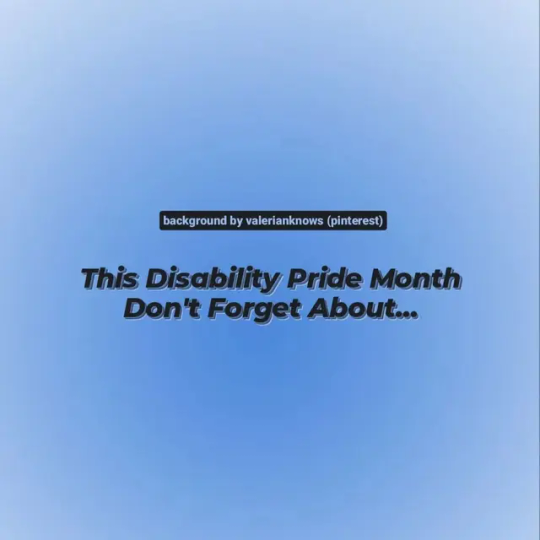
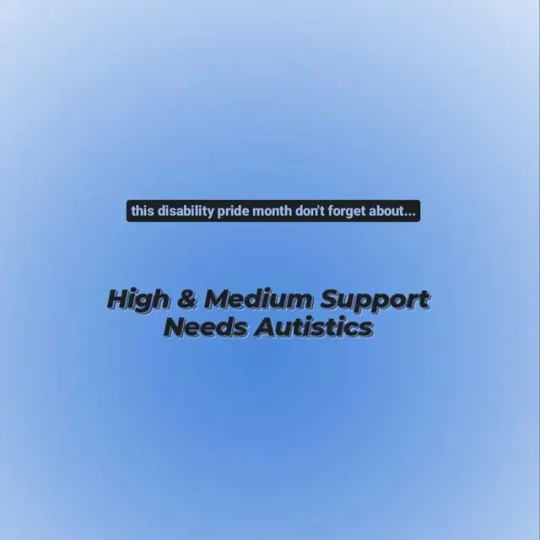
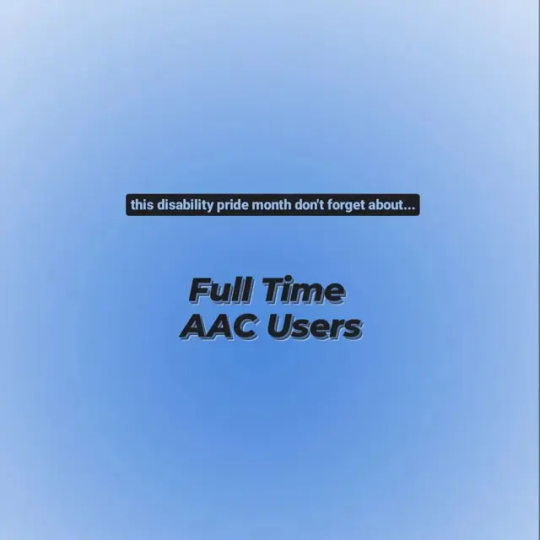
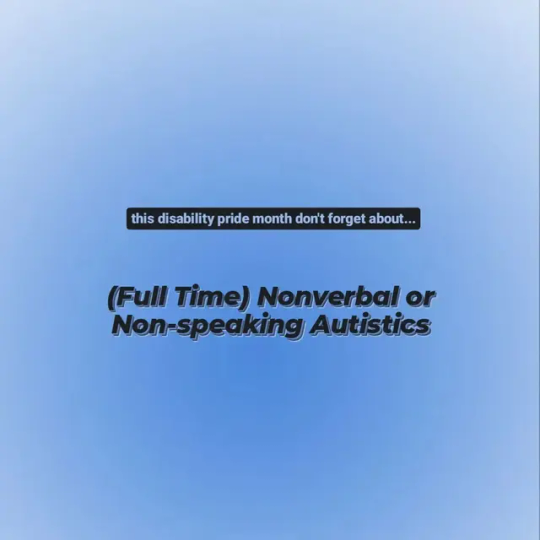

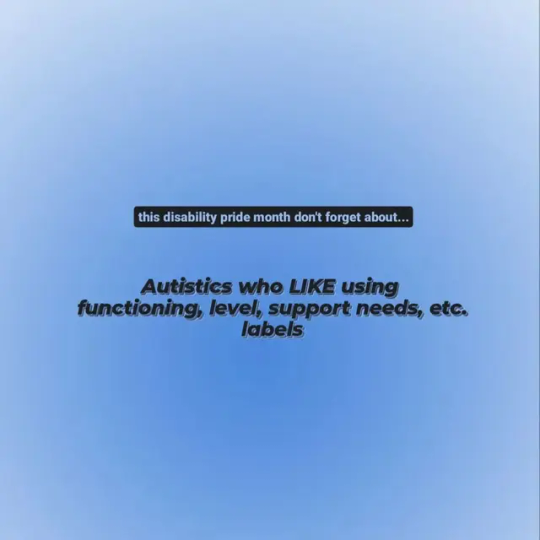

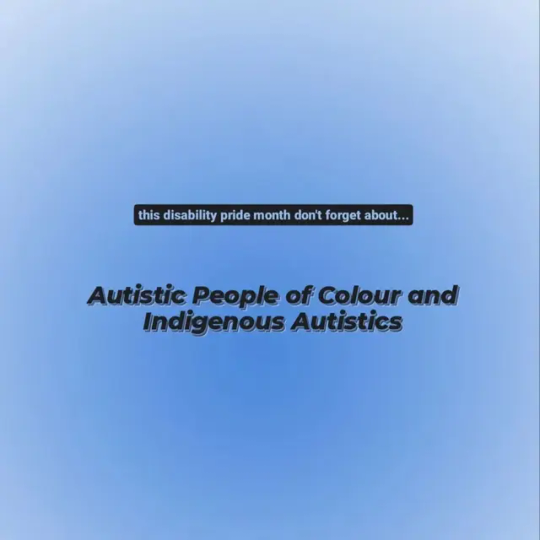
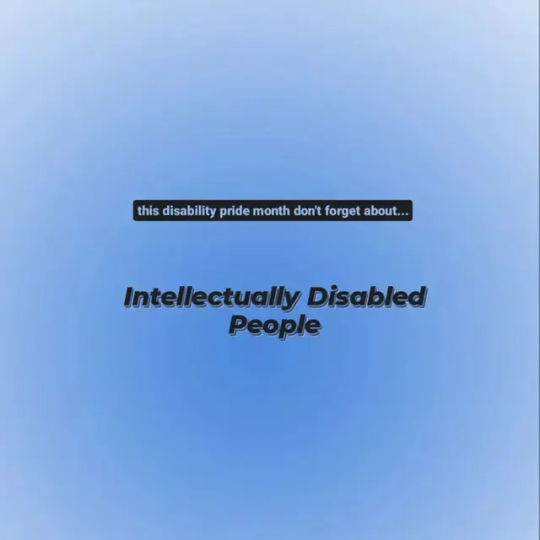

[ID: A background with deep blue in the centre, which fades to a lighter blue. Text reads; background by valerianknows (pinterest). This disability pride month don't forget about...
this disability pride month don't forget about... high & medium support needs autistics.
this disability pride month don't forget about... Full time AAC users.
this disability pride month don't forget about... high & medium support needs autistics. (Full Time) Nonverbal or non-speaking autistics.
this disability pride month don't forget about... autistics with speech delays and/or speech impairments.
this disability pride month don't forget about... autistics who LIKE using functioning, level, support needs, etc. labels.
this disability pride month don't forget about... autistics that cannot type in "complete" sentences.
this disability pride month don't forget about... autistic people of colour and indigenous autistics.
this disability pride month don't forget about... intellectually disabled people.
this disability pride month don't forget about... developmentally disabled people. End ID]
#autism#autistic#actually autistic#autism spectrum disorder#developmental disability#intellectual disability#aac#aac user#nonverbal#non-speaking#medium support needs#high support needs#intellectually disabled#developmentally disabled#speech delay#speech impairment#full time aac user#from insta#image described#disability posting#neurodivergent posting#neurodivergent#neurodivergency#bipoc
80 notes
·
View notes
Text
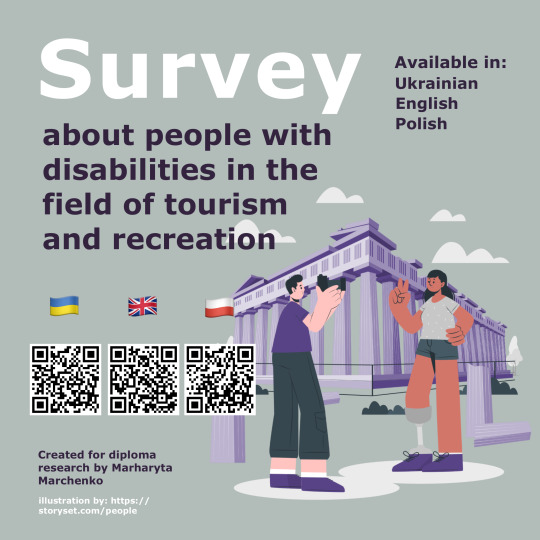
Hi guys! This post is not related to arts, but I will be very grateful to you for sharing it.🌸
This is a survey for my university's research. I study the problems of disabled people in tourism and recreation. This survey is anonymous.
The statistics collected in the surveys will be used for my university project.
I will be very grateful to everyone who completes the survey and sends it to their family members or friends✨️
The more people complete the survey, the more detailed statistics i will get, so it is important to spread it as much as possible.
You can scan it or use links below:
Ukrainian 🇺🇦
English 🇬🇧
Polish 🇵🇱
#tourism#parks and recreation#people with disabilities#university project#disability#disabled#disabilties#accesibility#chronic illness#hard of hearing#sensory disability#physical disability#physically disabled#mental disability#intellectual disability#developmental disabilities#cognitive disability#visual impairment#legally blind#mobility aid#hearing loss#hearing impaired#speech impediment#hearing aids#hearing issues
54 notes
·
View notes
Text
I’ve noticed that in the drama group I’m in a lot of the time the improv characters people make up are just imitations of people with disabilities. Faking a limp or manipulating their body to mock people with cerebral palsy or imitating speech impediments and people with intellectual disabilities. I felt particularly alienated when one kid made a cripple joke and everyone laughed, people who claim to be “politically correct”, people who I consider my friends. People who call themselves disability allies, who call themselves punks. Everyone’s a leftist, everyone’s all for being kind until it comes to disabled people.
#disability#intellectual disability#speech impediment#speech impairment#physical disability#neurodivergent#ableism#cw ableism#cw ableist language#cripple punk#cpunk#punk#leftist#leftism#disabled advocacy#cerebral palsy
46 notes
·
View notes
Text
Magenta 😟
#I've had cognitive impairment from covid before but not to where i feel intellectually dumb when i write#my college papers and my writing projects dont sound like “me” as of late#its very bare bones and doesn't have the descriptiveness or humanity i normally give#like i see the scenes or what i want to say in my head#but what i type aint matching up#and yeah i naturally get into slumps like that but this is like that slump x 9000#I'm kinda scared this round might've given me brain damage#havent been feeling all the way like myself#but i also know too that covid takes a while to heal from and of course theres long covid shit which ive dealt with before#im just frustrated guys#i feel like within the last 3 to 4 months i finally healed from my last bout of rona#and i get it again and im back to square one#i just want to write and feel okay with it and not feel so stuck just trying to come up with a basic sentence#seriously even writing basic shit is hard right now#it took me a week to get 5 pages on duality#and im used to churning out at least 10 pages on my projects at minimum every couple days to a week#man give me chronic pain anyday but don't take away my mind and the freedom that comes with that#sorry guys im feeling sad#i know i gotta give myself time but im impatient#i hate how right before i caught covid again i was gonna get my flu shot and an updated covid vax#wish i could've avoided this crud#having weird chest shit too#was a heart thing now its gerd now its potentially back to a heart thing#im tired#i need a hug#i love you 🫂💙#magenta is my vent word
4 notes
·
View notes
Text
when kuru unable do thing (because cannot see, because cannot think right, because not good problem solve, or even because struggle mobility) mom always say kuru am is "weaponizing imcompetence" and "use disability as excuse". kuru feel bad and wrong, but still cannot do thing, so now just not tell her when cannot do and pretend to do, but when she find out thing is still not done she get even more mad and say kuru being lazy. kuru dont know what do any more. upset upset
#kuru noises#vent post#level 2 autism#medium support needs#actually autistic#intellectual disability#visually impaired#actually blind#actually schizospec#schizoaffective#actually schizo
25 notes
·
View notes
Text
Fucking hate how in stories (both mainstream media and fanfic) someone nearly dies or is thought lost, but then turns up changed with brain damage or some kind of disability. And their family and friends, instead of being happy the person they loved is alive and returned to them, they just start mourning the version of them they knew. "Please God let them live!" but then "No wait not like that". And then it's all about the tragedy of them "having to see" the one they supposedly loved changed and impaired, instead of gratitude for their life or focus on their thoughts and feelings in their disabled state. Like that one horrible TV show said: "I don't know what I'll do if this is all that's left of the person I love."
"All that's left." Disabled people being hollow shells instead of different versions of themselves who are still as important, who can feel happiness and joy and love. Once cognitively impaired we're less than human, the mourned living.
I know that "love is not love that alters when it alteration finds" is incomprehensible to abled people, whose compassion and care is inherently conditional, but at least once I'd like to see a story that said "as long as they're alive, we can figure out the rest". It's a very strange kind of love that can't grant you enough humanity to at least be happy that you're alive.
#ableds should just stop writing love stories#what y'all consider love is a fuckin nightmare#the biggest fuck you possible to the Flash tv series and their mutilation of Iris West's character#ableism#dehumanization#brain damage#intellectual disability#cognitive impairment#disability justice#relationships#fanfiction#toxic tropes#knee of huss
24 notes
·
View notes
Text
(self diagnosed inclusive, mentally ill included as nd)
#This is to get tumblr to see it's actively harming nd and disabled people with updates that are unnecessary#and also nt people im sure#but like#Agjfjfhffhfhdgskgsskgkgs#actually autistic#autism#adhd#neurodivergent#dyslexia#disability#vision impaired#ocd#mental illness#anxiety#polls#learning disability#intellectual disability
11 notes
·
View notes
Text
another rant but not about the fandom
so i’m taking the PSAT this week.
And if you’ve been following me for a while then you know I have albinism. Meaning I have a visual impairment. Meaning I have an IEP. (Basically means I have accommodations so that things are easier for me to see and I have the same opportunities as the rest of the kids in school)
And I’ve been told this whole fucking time that I would have every accommodation I need, meaning the font would be bigger, I can write essays on my computer and I’m allowed to use a magnifier to help me see
And now according to the damn cCollege Board, it’s ‘against the test policies’ and I can’t have my font enlarged and I’m also not able to type stuff up. Which is literally in my IEP that I’m allowed to do. And this isn’t as big of a problem for now because it’s just a PSAT, but I’m taking an AP test in May run by the College Board and I’m ALSO TAKING THE SAT soon. So essentially, I’m fucked.
#i also get double time because my eyes get tired and I need a break#and apparently that may not even be happening#i’m so sick of this shit#i fucking hate having an impairment#i fucking hate the school system#it’s all bullshit#if i don’t pass the sat because of visual issues im literally gonna fucking scream#i know when i do bad because of intellectual factors and i know when i do bad because teachers and administration refuse to give me what i#*i need to be successful#i’m literally so fucking pissed#skipper speaks#vent
2 notes
·
View notes
Text
Intellectual Disability
Intellectual disability is a condition characterized by significant limitations in both intellectual functioning and adaptive behavior. This condition affects a person’s ability to learn, reason, and perform everyday activities. Here are some key points: Definition: Intellectual disability involves impairments in cognitive functioning and adaptive behaviors, which include social and practical…
#behavior#birth#complications#cure#educational#genetic#impairments#injuries#Intellectual Disability#learning#life coach#malnutrition#social#speech#substance abuse#support#tests
1 note
·
View note
Text
PFAS (Forever Chemicals) found in all water samples from Mt. Everest to the Mariana Trench
Forever chemicals do not break down over time.
Forever chemicals are known to cause cancer, liver damage, thyroid damage, kidney damage, gestational diabetes, lower immune response, cognitive impairment, disrupted molecular pathways, intellectual and cognitive decline, behavioral disorders, ADHD, Alzheimer's, Parkinson's, and more.
Per- and polyfluoroalkyl substances originated in 1938 and have been used in non-stick coatings, stain- and water-resistant products, protective coatings, fire-fighting foams, fast food packaging, shampoos, paints, cookware, and more.
#conspiracies#conspiracy theories#brainwashing#the more you know#facts#watch out#pfas#pfas pollution#pfas chemicals#forever chemicals#pollution#environment#parkinson's disease#alzheimers#dementia#cognitive decline#cognitive impairment#intellectual disability#fast food#cancer#liver damage#kidney damage#dupont#it's not paranoia if they're actually out to get you#protect the planet#too late#mt everest#everest#mariana trench#water contamination
1 note
·
View note
Text
Depression and psychosis brain rot are not spoken about enough. the impairment is so real
0 notes
Text
reasons why I prefer audiobooks
it’s easier for me to listen to something than it is to look at words on a page
i can draw, paint, crochet, play video games, and drive while listening
lack of a physical copy means I can save space in my already crowded environment
what annoying people think are the reasons why i prefer audiobooks
i hate reading
i lack the ability to read
I think books are obsolete
I’m too stupid to read
I want to get rid of books completely
im a technology poisoned shit for brains that can’t comprehend the idea of holding a physical book in my hands
#b4 anyone asks why I didn’t include things like visual impairments or dyslexia or intellectual disabilities#it’s because this post is about me#im literally talking in regards to myself and nobody else#so don’t ‘’I feel uncomfortable when it isn’t about me’’ me
1 note
·
View note
Text
Where to Start Your Research When Writing a Disabled Character
[large text: Where to Start Your Research When Writing a Disabled Character]
So you have decided that you want to make a disabled character! Awesome. But what's next? What information should you decide on at the early phrase of making the character?
This post will only talk about the disability part of the character creation process. Obviously, a disabled character needs a personality, interests, and backstory as every other one. But by including their disability early in the process, you can actually get it to have a deeper effect on the character - disability shouldn't be their whole life, but it should impact it. That's what disabilities do.
If you don't know what disability you would want to give them in the first place;
[large text: If you don't know what disability you would want to give them in the first place;]
Start broad. Is it sensory, mobility related, cognitive, developmental, autoimmune, neurodegenerative; maybe multiple of these, or maybe something else completely? Pick one and see what disabilities it encompasses; see if anything works for your character. Or...
If you have a specific symptom or aid in mind, see what could cause them. Don't assume or guess; not every wheelchair user is vaguely paralyzed below the waist with no other symptoms, not everyone with extensive scarring got it via physical trauma. Or...
Consider which disabilities are common in real life. Cerebral palsy, muscular dystrophy, stroke, cataracts, diabetes, intellectual disability, neuropathy, multiple sclerosis, epilepsy, thyroid disorders, autism, dwarfism, arthritis, cancers, brain damage, just to name a few.
Decide what specific type of condition they will have. If you're thinking about them having albinism, will it be ocular, oculocutaneous, or one of the rare syndrome-types? If you want to give them spinal muscular atrophy, which of the many possible onsets will they have? If they have Ehlers-Danlos Syndrome, which one out of the 13 different types do they have? Is their amputation below, or above the knee (it's a major difference)? Not all conditions will have subtypes, but it's worth looking into to not be surprised later. This will help you with further research.
If you're really struggling with figuring out what exact disability would make sense for your character, you can send an ask. Just make sure that you have tried the above and put actual specifics in your ask to give us something to work with. You can also check out our "disabled character ideas" tag.
Here are some ideas for a character using crutches.
Here are some ideas for a character with a facial difference (obligatory link: what is a facial difference?).
If you already know what disability your character is going to have;
[large text: If you already know what disability your character is going to have;]
Start by reading about the onset and cause of the condition. It could be acquired, congenital, progressive, potentially multiple of these. They could be caused by an illness, trauma, or something else entirely. Is your character a congenital amputee, or is it acquired? If acquired - how recently? Has it been a week, or 10 years? What caused them to become disabled - did they have meningitis, or was it an accident? Again, check what your options are - there are going to be more diverse than you expect.
Read about the symptoms. Do not assume or guess what they are. You will almost definitely discover something new. Example: a lot of people making a character with albinism don't realize that it has other symptoms than just lack of melanin, like nystagmus, visual impairment, and photophobia. Decide what your character experiences, to what degree, how frequently, and what do they do (or don't do) to deal with it.
Don't give your character only the most "acceptable" symptoms of their disability and ignore everything else. Example: many writers will omit the topic of incontinence in their para- and tetraplegic characters, even though it's extremely common. Don't shy away from aspects of disability that aren't romanticized.
Don't just... make them abled "because magic". If they're Deaf, don't give them some ability that will make them into an essentially hearing person. Don't give your blind character some "cheat" so that they can see, give them a cane. Don't give an amputee prosthetics that work better than meat limbs. To have a disabled character you need to have a character that's actually disabled. There's no way around it.
Think about complications your character could experience within the story. If your character wears their prosthetic a lot, they might start to experience skin breakdown or pain. Someone who uses a wheelchair a lot has a risk of pressure sores. Glowing and Flickering Fantasy Item might cause problems for someone photophobic or photosensitive. What do they do when that happens, or how do they prevent that from happening?
Look out for comorbidities. It's rare for disabled people to only have one medical condition and nothing else. Disabilities like to show up in pairs. Or dozens.
If relevant, consider mobility aids, assistive devices, and disability aids. Wheelchairs, canes, rollators, braces, AAC, walkers, nasal cannulas, crutches, white canes, feeding tubes, braillers, ostomy bags, insulin pumps, service dogs, trach tubes, hearing aids, orthoses, splints... the list is basically endless, and there's a lot of everyday things that might count as a disability aid as well - even just a hat could be one for someone whose disability requires them to stay out of the sun. Make sure that it's actually based on symptoms, not just your assumptions - most blind people don't wear sunglasses, not all people with SCI use a wheelchair, upper limb prosthetics aren't nearly as useful as you think. Decide which ones your character could have, how often they would use them, and if they switch between different aids.
Basically all of the above aids will have subtypes or variants. There is a lot of options. Does your character use an active manual wheelchair, a powerchair, or a generic hospital wheelchair? Are they using high-, or low-tech AAC? What would be available to them? Does it change over the course of their story, or their life in general?
If relevant, think about what treatment your character might receive. Do they need medication? Physical therapy? Occupational therapy? Orientation and mobility training? Speech therapy? Do they have access to it, and why or why not?
What is your character's support system? Do they have a carer; if yes, then what do they help your character with and what kind of relationship do they have? Is your character happy about it or not at all?
How did their life change after becoming disabled? If your character goes from being an extreme athlete to suddenly being a full-time wheelchair user, it will have an effect - are they going to stop doing sports at all, are they going to just do extreme wheelchair sports now, or are they going to try out wheelchair table tennis instead? Do they know and respect their new limitations? Did they have to get a different job or had to make their house accessible? Do they have support in this transition, or are they on their own - do they wish they had that support?
What about *other* characters? Your character isn't going to be the only disabled person in existence. Do they know other disabled people? Do they have a community? If your character manages their disability with something that's only available to them, what about all the other people with the same disability?
What is the society that your character lives in like? Is the architecture accessible? How do they treat disabled people? Are abled characters knowledgeable about disabilities? How many people speak the local sign language(s)? Are accessible bathrooms common, or does your character have to go home every few hours? Is there access to prosthetists and ocularists, or what do they do when their prosthetic leg or eye requires the routine check-up?
Know the tropes. If a burn survivor character is an evil mask-wearer, if a powerchair user is a constantly rude and ungrateful to everyone villain, if an amputee is a genius mechanic who fixes their own prosthetics, you have A Trope. Not all tropes are made equal; some are actively harmful to real people, while others are just annoying or boring by the nature of having been done to death. During the character creation process, research what tropes might apply and just try to trace your logic. Does your blind character see the future because it's a common superpower in their world, or are you doing the ancient "Blind Seer" trope?
Remember, that not all of the above questions will come up in your writing, but to know which ones won't you need to know the answers to them first. Even if you don't decide to explicitly name your character's condition, you will be aware of what they might function like. You will be able to add more depth to your character if you decide that they have T6 spina bifida, rather than if you made them into an ambiguous wheelchair user with ambiguous symptoms and ambiguous needs. Embrace research as part of your process and your characters will be better representation, sure, but they will also make more sense and seem more like actual people; same with the world that they are a part of.
This post exists to help you establish the basics of your character's disability so that you can do research on your own and answer some of the most common ("what are symptoms of x?") questions by yourself. If you have these things already established, it will also be easier for us to answer any possible questions you might have - e.g. "what would a character with complete high-level paraplegia do in a world where the modern kind of wheelchair has not been invented yet?" is more concise than just "how do I write a character with paralysis?" - I think it's more helpful for askers as well; a vague answer won't be of much help.
I hope that this post is helpful,
mod Sasza
#mod sasza#writing reference#writing advice#writing resources#writeblr#writing disabled characters#writing resource#long post#writing tips#writing guide
3K notes
·
View notes
Text
laws should be written by simple language.
scientific books should be written by simple language.
studies should be written by simple language.
rules & regulations should be written by simple language.
every information, especially important one, should be written by simple language.
it's basic accessibility. people with intellectual disability, people with developmental disabilities, people with learning disabilities, people with language processing issues/language impairment, people with brain fog/low concentration, and people with other conditions that make comprehension difficult should have access to every information, especially important one.
i'm autistic and have some language processing issues. so i feel very isolated when i can't read studies, articles, books, and other info. i'm really interested in it, but can't process language. so i have to rely on others' interpretations instead of original text.
i wanna have access to first-hand information. i wanna have the opportunity to form my own opinion, not rely on others' explanations.
btw, "simple language" doesn't mean "avoid complicated ideas & nuances", it means "explain complicated ideas & nuances using mostly simple words and short sentences".
#neurodivergent#actually neurodivergent#accessibility#ableism#intellectual disability#developmental disabilities#learning disabilities#brain fog#actually autistic
2K notes
·
View notes
Text
i don’t know how much distress tolerance and radical acceptance i’ve got left in me
#being 🏳️⚧️#and being intellectually/cognitively handicapped while having JUST enough self awareness to know i am impaired#reeeeeeally pushes these skills to the test#boing 🐰#there is nothing about myself i enjoy that others don’t do better#why do i even exist i am just pond scum in motion#FOR GOD’s SAKE#can i be ‘smart’ in a way that is visible to others#in a way that PLEASES others#NOT JUST in a mindless philosopher way FOR FUCK’S SAKE#my god i can’t handle this dysphoria
0 notes